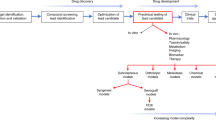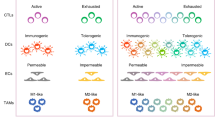Abstract
Three factors may be responsible for the sharp difference in tumourigenicity between cloned murine fibrosarcoma lines maintained in vitro, and cells of the same lines after in vivo passage, initially in a T cell deficient mouse and subsequently in normal mice: acquisition during passage of resistance to NC cells; acquisition during passage of a surface molecule, probably a sialic acid, which protects the cell against T cell-mediated lysis; and ability of the passaged cells, but not the non-passaged cells, to produce sufficient amounts of autocrine growth factors necessary for growth in vivo. The tumourigenicity of the passaged cells cannot be attributed to failure to express TATA or MHC class I molecules.
This is a preview of subscription content, access via your institution
Access options
Subscribe to this journal
Receive 24 print issues and online access
$259.00 per year
only $10.79 per issue
Buy this article
- Purchase on Springer Link
- Instant access to full article PDF
Prices may be subject to local taxes which are calculated during checkout
Similar content being viewed by others
Rights and permissions
About this article
Cite this article
Woodruff, M., Hodson, B. & Deane, D. The effect of passage in vivo and in vitro on the properties of murine fibrosarcomas: III Cell surface molecules and production of growth factors. Br J Cancer 54, 623–629 (1987). https://doi.org/10.1038/bjc.1986.218
Issue Date:
DOI: https://doi.org/10.1038/bjc.1986.218



